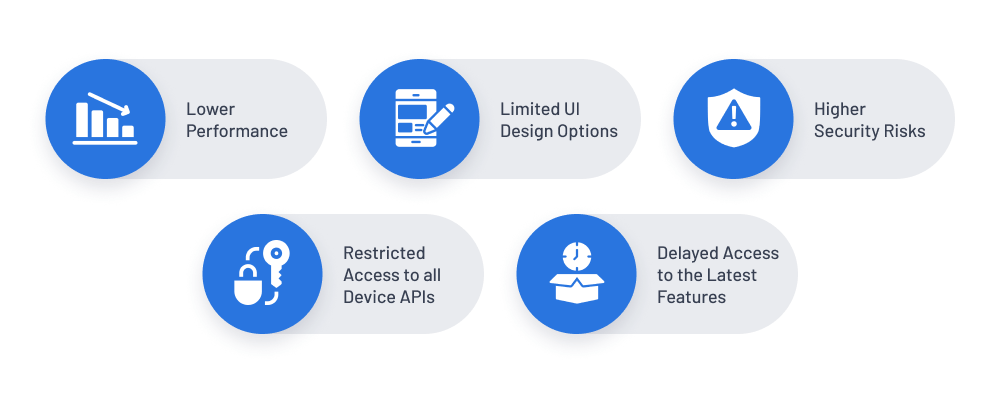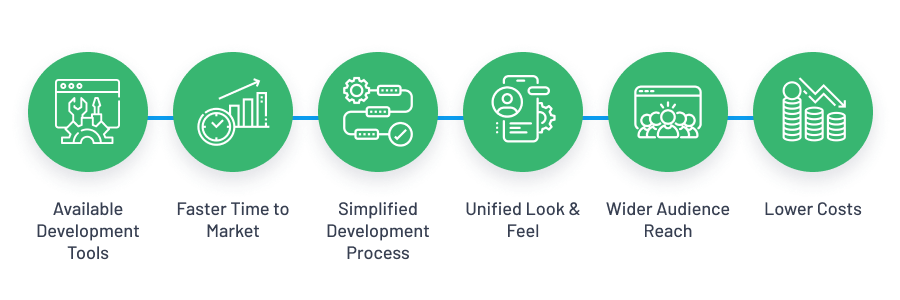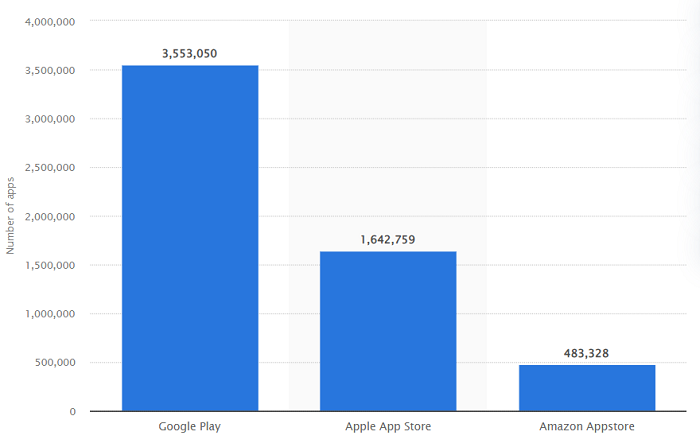According to a Statista research, 97% of U.S. adults aged 30 to 49 years owned a smartphone in 2022. Most of these devices run on iOS or Android operating systems.

Businesses need a strategy to reach audiences on these platforms. They have two options:
- Develop separate apps for each platform
- Implement a cross-platform mobile application
This article examines why you should consider using a cross-platform approach for mobile app development.
Why Is a Cross-Platform Approach So Popular?
Like most companies, you want to reach as large of an audience as possible. You understand how more users equals a larger revenue base.
Simultaneously, you do not want to start fresh developing native apps for every operating system. Separate apps are expensive and usually take longer to develop. This is where a mobile cross-platform development approach becomes useful.
The time to market for two-three apps designed for several platforms is significantly less as opposed to when you need to develop a separate native app for each platform. This allows companies to reach the target audience faster regardless of the platform they use.
However, before building a mobile solution for both platforms, it’s essential to learn all the pros and cons of cross-platform mobile application development. Let’s first explore the challenges related to this strategy and then move to the benefits you can gain.
Choosing a Winning App Development Strategy
Watch our webinar to uncover effective mobile development approaches and launch your app.
Mobile Cross-Platform App Development Challenges

How do you manage your app on different mobile devices, versions, and operating systems? This is one of the challenges of using a cross-platform strategy for your app.
The complexity of dealing with the rules and requirements for each platform leads many businesses to focus on only one platform.
Most companies do not have the resources for application development over multiple platforms. Yet, those are still the companies that have a great need to reach these diverse audiences.
Additionally, growing companies often need more sophisticated solutions. A separate mobile app for each platform might work better at a later stage.Keep this in mind as you develop a mobile app for your business.
Thus, simplicity at the beginning is important. Too much complexity, and it becomes difficult to create a cross-platform app. You should also remember that cross-platform development tools have their own limitations on access to smartphones’ functionality.
In general, app developers highlight the following constraints and challenges of the cross-platform approach:
- Slower app performance
- Fewer options for UI design
- Limited access to all device APIs
- More chances for security issues
- Delayed access to the latest features
Yet, even with all these limitations, cross-platform remains a reliable and efficient approach that companies leverage when having a limited budget.
6 Key Benefits to Pursue a Mobile Cross-Platform Development Strategy

Apparently, a cross-platform approach is one of the most effective for delivering a mobile application if you’re short of time or budget but don’t want to lose in quality. Of course, it’s just a few of the benefits cross-platform development provides.
So let’s move to the key reasons that make businesses turn to this type of mobile app development.
1. Array of Available Development Tools
It’s a great time to leverage this approach since more and more tools appear on the market. Several technologies exist right now to help developers create these applications. Some of them include Xamarin, React Native, Ionic, Titanium, PhoneGap/Cordova, etc.
Each of these tools has its own advantages and disadvantages and presupposes the knowledge of particular programming skills. You should select one carefully because it will lock you into a certain tech stack.
2. Faster to App Store
These development tools allow companies to bring their mobile apps to market much faster. Tools like Ionic and React Native deliver a framework for developers to build custom-made apps in a fraction of the time it would take to code apps for each mobile OS individually.
Read more about the Cross-Platform Frameworks and Technologies
All subsequent updates to cross-platform apps obviously appear faster in the corresponding app stores.
3. Simplified Process
Our goal at Velvetech is to simplify the process for you. And the cross-platform approach allows for that, supporting an easy and efficient way to deliver your solution.
It offers a strategic launching point for any company that wants access to multiple mobile platforms and to overcome budget or time constraints. Our team uses a time-proven workflow that includes a clear line of communication and an iterative development process with milestones.
Whether you need help with your Android or iOS software development, let us know how we can help you.
Contact us at (847) 559-0864 or leave your details in the form below.
4. Unified Look and Feel Across Multiple Platforms
Humans by nature crave consistency. Your mobile app is no exception to this rule. Carefully track all aspects of your brand on your mobile apps on all mobile platforms to ensure your target market has a consistent experience.
Learn why a UX Strategy Is Essential for Successful Software Products
At the same time, cross-platform development frameworks allow you to create individual UI/UX for your apps according to the platform requirements. Apple and Android users have different UX expectations.
Therefore, if the budget allows, it would be wise to tweak your cross-platform developed apps a little, so that they look and feel natural on iOS and Android.
5. Reach a Wider Audience
Android is the leading mobile OS with over 3.55 million apps in the Google Play Store. The Apple App Store follows closely behind with 1.64 million apps, while the Amazon Store trails with 480K apps. These are the main mobile app depositories.

Source: Statista
Each store has a significant marketing engine ready to help you spread your message to its customers. The key is providing enough value with your cross-platform mobile app.
6. Lower Development Cost
Usually, developing a cross-platform application takes less time as there’s a large part of the code that can be used for both platforms simultaneously. It means that there’s a shared codebase, which lowers the costs of building an app.
On top of that, you don’t have to hire several developers with Android and iOS expertise. Instead, you just need one team with skills in delivering cross-platform solutions. That, of course, affects the costs as well.
Lack of Developers
Find out how to deal with the lack of IT talents without compromising project delivery.
Final Thoughts
Publishing your mobile app across multiple platforms presents a multitude of challenges. However, a cross-platform approach allows you to optimize your mobile app development strategy to reach a wider audience.
If you have questions about how to implement mobile strategy and leverage the advantages of cross-platform development, contact us at Velvetech for a free initial consultation. Kick off your project today by filling out the form below.
































